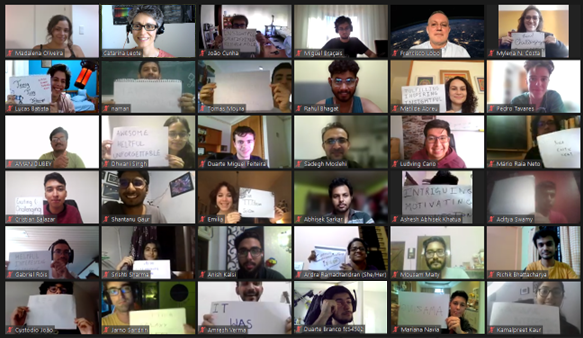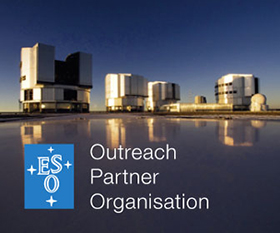With a record number of applications, the summer internships of Instituto de Astrofísica e Ciências do Espaço took place during the month of July.
The IAstro 2022 summer internship program had its third edition from the 11th to the 29th of July. For three weeks, undergraduate and master’s students from all over the world, in the fields of physics, engineering, mathematics, data science and education, developed research projects in astrophysics, cosmology and science communication.
Under the supervision of researchers and communicators from the Instituto de Astrofísica e Ciências do Espaço (IA1), the students participated in 21 different projects. These included, among others, the study of the composition and origin of exoplanets, the characterization and classification of galaxies using machine learning, the feasibility of using wormholes for interstellar travel, and even a ” teeny tiny telescope”, designed as a practical activity for children at the Porto Planetarium – Centro Ciência Viva
The internships, which took place in a hybrid format (online and face-to-face), received almost two hundred applications from countries such as Portugal, Brazil, Mozambique, Italy, Greece, India, Bolivia or Mexico. Due to the high demand, only about 1/3 of the applications, from nine different nationalities, were selected.
The program also included three workshops on science communication, guided by the IA Science Communication Group, in which students could learn about public engagement with science, oral communication and visual communication, “soft skills” vital for these future researchers.
“The internship really enhanced my knowledge horizons and also gave me a platform to make global networks in my field of study. The science communication workshops taught me things that I haven’t thought about while communicating my science to others. In short, I had a wonderful, interesting and knowledgeable experience at the IAstro Internships 2022.”
The students presented their work in the final seminar, in which the spirit of sharing and mutual help, as well as the quality of the work, confirmed how science is a global borderless effort.
“The exchange with people of different cultures enriches the experience beyond the ”science” goal of the project. Research allows to interconnect people from all over the world and these internships are indeed an example.”
Noemi Frusciante, supervisor of two projects and currently an IA collaborator
As a member of the Science Communication Group and coordinator of the program, it was gratifying to see the commitment and effort of the students in their final presentations, regarding both the scientific content and the quality of the communication, making use of the training in science communication.
Notes
- The Instituto de Astrofísica e Ciências do Espaço (Institute of Astrophysics and Space Sciences – IA) is the reference Portuguese research unit in this field, integrating researchers from the University of Lisbon and the University of Porto, and encompasses most of the field’s national scientific output. It was evaluated as Excellent in the last evaluation of research and development units undertaken by Fundação para a Ciência e Tecnologia (FCT). IA’s activity is funded by national and international funds, including FCT/MCES (UIDB/04434/2020 and UIDP/04434/2020).
Contacts (Science Communication Group)
Catarina Leote, Ricardo Cardoso Reis; Sérgio Pereira; Filipe Pires (coordination, Porto); João Retrê (coordination, Lisboa)


